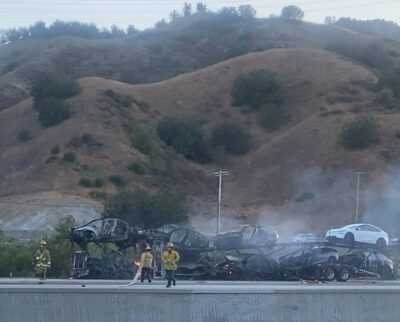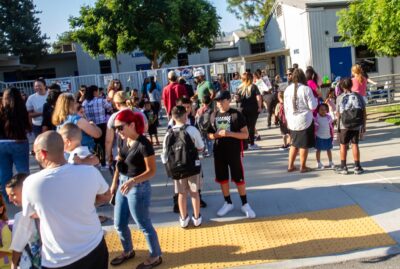After a day of striking in Los Angeles County over contract negotiations, local county union workers demanding better pay picketed in Santa Clarita on Wednesday, just outside the L.A. County Family Service’s office in Valencia.
A group of social workers, mental and health care professionals, parks and recreation staff, public works personnel, and other county professionals held signs that read “We are the Safety Net! LA County (Unfair Labor Practice) Strike.”
The two-day strike, which was announced by the Service Employees International Union Local 721 — which represents county and city employees — was in response to a lack of contract negotiations and the county management’s “repeated lawbreaking and failure to bargain in good faith,” including “citing 44 alleged labor law violations to date,” an SEIU news release stated.
According to the news release, those violations include: refusal to bargain with union members, surveillance and retaliation against SEIU 721 members engaged in union activity, restricting union organizers’ access to worksites, and contracting out of SEIU 721-represented positions.

L.A. County Supervisor Kathryn Barger, who represents the Santa Clarita Valley and serves as the current chair of the Board of Supervisors, issued a statement Wednesday evening expressing hope that negotiations can be fruitful.
“I deeply value our county workforce — they are the heartbeat of Los Angeles County, delivering vital services that millions of residents rely upon every day. I strongly support fair and competitive compensation for our employees and recognize the critical role they play in the county’s success,” Barger said in the statement.
“As labor action takes place this week, I remain hopeful that both the county and labor representatives will come to the table with a shared commitment to reaching a balanced agreement — one that is responsive to the needs of our workforce while also acknowledging the fiscal realities the county is grappling with,” Barger added. “Fiscal responsibility must guide our negotiations to both ensure the long-term stability of the county’s services and operations and protect county jobs. Neither must be sacrificed.”
Out on the picket line, children’s social workers Chelsea Cooper-Derrick and Esmeralda Melo were among the dozens of protesters who assembled at 7 a.m. on Avenue Stanford and had no plans of leaving until 5 p.m., which was when the strike would come to an end.
“They are not meeting any of our requests for higher pay. We’re asking for cost-of-living adjustment because of inflation, we’re asking for our pay just to reflect that, and they are not giving us that, or any kind of raise,” Cooper-Derrick said.
Housing, groceries, health insurance, and supporting their families are a few of the reasons why Cooper-Derrick and Melo, along with the other picketers, said they were present for the second day of the strike.
For Melo, there is no better job than actively working to give families in need the resources to thrive and help them create a promising future for themselves.
Often they use their own personal resources and work around the clock to fully provide the services they can for vulnerable families, Cooper-Derrick and Melo said.
But it’s “doing the work of God,” Melo said, and “I love my job, I love what I do. I love serving families and can’t think of doing something else,” she said, but added that, due to a lack of raises, she and many other county workers struggle financially.
“Buying a home with this salary doesn’t seem fathomable. I can’t think of changing my career, because it’s not right,” Melo said, adding that she tells herself, “‘I’m just going to figure it out, figure out how to make ends meet,’ but to build some sort of generational wealth for me and my family doesn’t seem possible.”

Cooper-Derrick works with 18- to 20-year-olds who voluntarily seek additional assistance.
“I’m one of the only ones that they have that they can talk to. I’m the one driving them to their doctor’s appointments. I’ve been able to be one of the first people that’s affirming in their lives,” she said. “For me, it’s really important that our health benefits are covered … I have a husband who’s an immigrant. We need to share health care benefits, and without our health care getting raised we could lose health care, and that means that I won’t be able to help take care of the families that I work with because I’m too sick or I need help.”
Children’s social worker Anthony Cervantes expressed the importance of rallying for better pay and keeping management accountable.
“When I came into the county 20-plus years ago, this job [said], ‘Hey we’re going to protect you,’” Cervantes said. “The social workers, we all went on strike in 2013 to get the case loads down, and they listened to us.”
The ULP Strike directly impacted more than 55,000 L.A. County employees as well as nearly 10 million county residents, according to the union’s news release, and was the first of its kind in Los Angeles County history.
Cervantes added: “We need to all be in unity with this, because when we fight, we win.”
During the strike, the public may have experienced delays in services including Animal Care and Control, beaches and harbors, and health and administrative services, according to the L.A. County website.
The Department of Child and Family services acknowledged the strike on its Facebook page, stating that “DCFS has made efforts to secure sufficient staffing so that essential services can be provided,” within the SEIU 721 two-day strike.
“At this time, the department anticipates we will be able to provide those services without interruption during the pendency of the strike,” read the post, written before the strike took effect. “Suspicions of neglect or abuse may be reported 24/7 to the Child Abuse Hotline at 800-540-4000. The safety and well-being of children continue to be our top priorities.”








